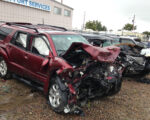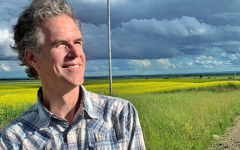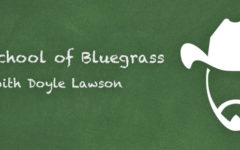
Three years ago today I caused a serious car accident driving home to Boulder from the RockyGrass Festival in Lyons, Colorado. At about 2:30 a.m. I briefly nodded off to sleep, and drifted into oncoming traffic. I snapped awake a split second before hitting an oncoming car. I swerved as best I could and my vehicle hit almost head-on with another car, both of us traveling at about 60 mph. In the other car, the passenger died from the impact, and the driver suffered several serious injuries. I sustained serious internal injuries, a concussion, and a few broken bones. I spent a week in the hospital and a month at home in bed. There were also legal ramifications, including the loss of my license and community service.
There are no words to describe the terrible impact that my decision to drive home had on the family of the man who died in the accident. Not a day goes by that I do not think about that day and the accident. I have been reflecting on what I might say in this article, and how I could frame my experience into lessons that could help others make better choices. My hope is that this article will encourage you think twice before driving when tired at any hour.
We all have heard that life can change in an instant. Mine did. Prior to that day, I had never really considered the lifelong emotional ramifications of a serious car accident. The combination of second-guessing myself and the true rattling of my soul has resulted in much ruminating on my decisions. I caused an incalculable amount of pain and suffering to the family of the man who died, the driver and his family, not to mention my own family and my larger community of friends.
Since we drive all the time, and cars are simple and comfortable to operate, it is remarkably easy to become complacent about what a significant responsibility this is. One can easily lose touch with the fact that a car is a giant piece of metal hurtling at incredible speeds until an accident occurs. The sound and force when my car hit the other will stick with me forever, and three years later it continues to haunt me.
According to DrowsyDriving.org, the people most at risk of falling asleep driving are male shift workers ages 18-29 who are sleep deprived. That sounds like many of the musicians I know and love.
A musical path is one of passion, yet to pay the bills, to show up at the next gig in time for sound check, or hundreds of other reasons, we often make choices that compromise our sleep. The best musical moments often happen at 2:00 a.m., yet we may be up at 7:00 a.m. for a myriad of reasons (travel, work, kids, insomnia). Another factor that differs is the adrenaline rush from performing and jamming. Music is an undeniable high, and much of what motivates us to play music. It takes a while to unwind after these experiences, and when we do it is more of a nosedive than a slow descent. Timing-wise, this may happen driving home or to the next gig, when things are quiet, others in your van may be asleep, or you are driving alone (as I was).
When you begin to feel fatigued, take immediate steps to not fall asleep: pull over for a quick nap or to do some jumping jacks, call a friend, wake someone in the van, or drink coffee and 5-hour Energy. Do this no matter how close you are to your destination. I was only 5 miles from home and thought I could make it safely.
Other tips from DrowsyDriving.org include getting 7-9 hours of sleep, scheduling proper breaks (about every 100 miles or 2 hours of driving), and having a travel companion (someone to talk with and share the driving).
We may casually take the wheel when driving groups of our friends and coworkers and easily forget the sacred trust we have taken, that their lives are literally in our hands, not to mention all the other people on the road. Please let this article help us all recognize the sacred agreement we are taking when volunteering for the late night driving shift.
My hope in writing this article is that you see that this could happen to any of us. Because of the work we do, musicians are particularly at risk of driving while tired, but every person that gets behind the wheel of a car needs to remember the potential impact of their choices.
In loving memory of the life that was lost.








